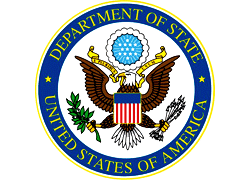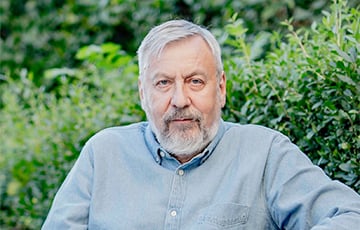US concerned: Legal situation in Belarus continues to deteriorate
7- 26.02.2009, 13:39

The US Department of the State has called the situation with human rights in Belarus “alarming”.
On February 25 the US Department of the State has published its traditional annual report of the situation with human rights in the world. It was presented by Hillary Clinton, Secretary of State. The document characterises 190 states of the world.
The situation with human rights and freedoms in Belarus in 2008 was characterised as alarming by the Department of State, as “the government further restricted civil liberties, including freedoms of press, speech, assembly, association, and religion”.
Among other things analysts of the US Department of State said that the legal situation in Belarus the following:
- The right of citizens to change their government was severely restricted.
- The government failed to account for past politically motivated disappearances.
- Prison conditions remained extremely poor, and reports of abuse of prisoners and detainees continued.
- Arbitrary arrests, detentions, and imprisonment of citizens for political reasons, criticizing officials, or for participating in demonstrations also continued.
- Some court trials were conducted behind closed doors without the presence of independent observers.
- The judiciary branch lacked independence and trial outcomes usually were predetermined.
- The government further restricted civil liberties, including freedoms of press, speech, assembly, association, and religion.
- The government seized published materials from civil society activists and closed or limited the distribution of several independent media outlets.
- State security services used unreasonable force to disperse peaceful protesters.
- Corruption continued to be a problem.
- Nongovernmental organizations (NGOs) and political parties were subjected to harassment, fines, prosecution, and closure.
- Religious leaders were fined, imprisoned or deported for performing services, and churches were either closed, deregistered, or had their congregations evicted.
- Trafficking in persons remained a significant problem, although some progress was made to combat it.
- There was discrimination against Roma, ethnic and sexual minorities, and against use of the Belarusian language.
- Authorities harassed independent unions and their members, severely limiting the ability of the workers to form and join independent trade unions and to organize and bargain collectively.
Some extracts from the report of the US Department of State. 2008 Human Rights Report: Belarus.
It is stated in the report in particular that police in Belarus continues to beat peaceful protestors. On January 10 and 21, riot police forcefully broke up demonstrations in Minsk organized by small business owners and activists. At both demonstrations crowds estimated at 1,500 gathered to protest a presidential order that restricted small business hiring practices. More than 45 entrepreneurs and activists were arrested; some were beaten by police while in detention.
On September 16, police forcefully dispersed a monthly "solidarity day" gathering in Minsk to mark the 1999 disappearances of opposition figures. Riot police forced some 40 demonstrators out of the central square, beating several.
It is noted in the report that police frequently detained and arrested individuals without a warrant, ostensibly to confirm their identity. This tactic was frequently used to detain members of the opposition and demonstrators, to prevent the distribution of leaflets and newspapers, or as a pretext to break up civil society meetings.
On July 26, police and BKGB representatives detained and released approximately 50 youth activists for violating environmental laws while they were camping near a lake in the Borisov district. The youths were participating in a three-day camp organized by the European Belarus coalition.
Authorities placed persons under modified house arrest. An activist of the civil campaign “European Belarus” Alyaksandr Barazenka was sentenced to restriction of freedom for 1 year without sending him to special penal facilities. He was held in the remand prison from October 27 till December 9, 2008 before the trial. Other participanst ifthe Porcess of Fourteen, Alyaksei Bondar, Artsyom Dubski, Mikhal Kryvau, Mikhal Pashkevich, Ales Straltsou, Ales Charnyshou, Tatsyana Tsishkevich, Mikhail Subach and Paval Vinahradau, , were sentenced to restriction of freedom for 2 years without sending them to penitentiary institutions. Minor Maxim Dashuk received an 18-month restrain of freedom. A young activist Andrei Kim was sentenced to an 18-month jail term for allegedly threatening a police officer during a demonstration. He was released in August 2008.
The law also provides for public trials; however, trials were occasionally closed and frequently held in judges' offices. The law provides for access to legal counsel for detainees and requires that courts appoint lawyers for those who cannot afford one; however, at times these rights were not respected, and some detainees were denied access to a lawyer.
There were no progress in the investigations in disappearances of opposition activists. On April 8, the prosecutor general extended for another three months its nine-year investigation into the 1999 disappearance of former interior minister and opposition leader Yury Zakharenka. There were no developments in the ongoing investigations in the 1999 disappearances of opposition activist Viktar Hanchar and businessman Anatoly Krasouski. In 2006 authorities suspended the investigation into the disappearance and presumed killing in 2000 of journalist Dzmitry Zavadsky. There was evidence of government involvement in these cases, but authorities continued to deny any involvement in the disappearances.
The government restricted access to the Internet, and monitored e-mail and Internet chat rooms. Many individuals and groups could not engage in the peaceful expression of views via the Internet, including by e-mail.
The authorities freely monitor internet traffic. Internet cafe owners are required to maintain records of their customers and submit them to government security services. By law, Beltelekom and other organizations authorized by the government have the exclusive right to maintain Internet domains.
Approximately 30 percent of the population, particularly in urban areas, had access to the Internet. Access was restricted by relatively high costs and lack of high-speed services. On occasion state providers blocked independent and opposition Web sites during major political events.
On January 10, the Web sites of Radio Liberty, Charter 97, Belarusian Partisan, and the United Civic Party were partially or fully blocked because of their then-ongoing coverage of the demonstrations by small business owners in Minsk. Access to the Radio Liberty, Radio Svoboda, and Charter 97 Web sites was again disrupted in April prior to demonstrations marking the anniversary of the Chernobyl disaster.
On August 4, Lukashenka signed into law new regulations that will subject Internet news outlets to the same requirements as print media, including registration. The law, which takes effect in February 2009, will also allow the state to legally block any unregistered Web sites, regardless of their origin.
It is stated in the report, that the government restricted academic freedom and cultural events in Belarus. Educational institutions were required to teach an official state ideology that combined reverence for the achievements of the former Soviet Union and the country under the leadership of Lukashenka. During the year authorities dismissed teachers and researchers on political grounds. According to an education ministry directive, educational institutions may expel students who engage in antigovernment or unsanctioned political activity and are to maintain the proper ideological education of students. During the year at least 10 students were expelled for politically motivated reasons, compared with 20 students in 2007 and more than 100 in 2006. However, some school officials continued to cite poor academic performance or absence from classes as reasons for expulsions.
Between January 21 and 22, three student activists--Tatyana Tsishkevich, Paval Kuryanovich and Zmitser Zhaleznichenka--were expelled from various higher education institutions. Tsishkevich was initially expelled from the Belarus State University for late payment of fees, but officials later said it was due to "violations against public order and morality." Kuryanovich was expelled from the Minsk State Radiotechnical College for missing classes because of his 20-day detention for participating in a January 16 protest. Zhaleznichenka, a member of the opposition Belarusian Popular Front, was expelled from Gomel State University for alleged violations of the institution's internal rules and an eight-day jail sentence he received after his first expulsion from the university in September 2007. In June, Franak Vyachorka, a member of the Belarusian Popular Front, and Ivan Shyla, a Malady Front leader, were dismissed from school for participating in unsanctioned opposition rallies.
In January a presidential decree replaced exit stamps with a computerized, government database to verify the validity of passports and to track citizens who travel abroad. According to the Ministry of Internal Affairs, the database contains the names of at least 100,000 persons who are prohibited from foreign travel, including those who possess state secrets, are facing criminal prosecution or civil suits, or have outstanding financial commitments. Opposition politicians and civil society activists criticized the database, saying it restricted freedom of travel. Some persons were informed by letter that their names were in the database; others were informed at border crossings. In some cases opposition activists were either turned away at the border or detained for lengthy searches.
At year's end the names of at least 17 opposition leaders and other activists were in the database, including Anatol Lyabedzka, Syarhei Skrabets, and youth leaders Zmitser Dashkevich, Zmitser Fedaruk, and Alyaksandr Atroshchankau.










